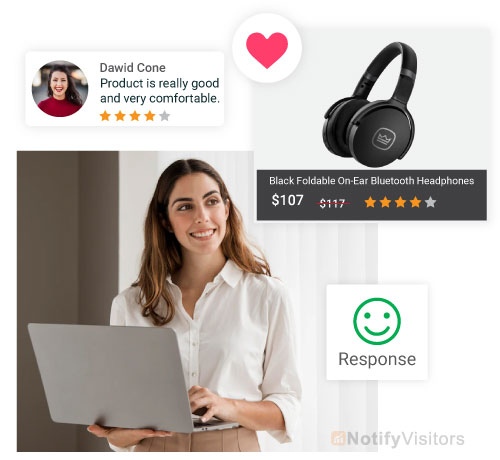Are you looking for tried-and-true tips on how to write engaging email subject lines? Are you struggling to keep up with the ever-changing digital landscape and need a few tricks to ensure your emails get noticed? Look no further – 15 Email Subject Line Best Practices for 2025 is here!
Contents
15 Email Subject Line Best Practices
1. Personalize subject lines

Personalization has become a fundamental element when it comes to marketing. And when we say this, we mean it is more than just adding a subscriber’s name into the subject line; everyone already does this.
Therefore, you have to be more specific to capture their attention and boost more email opens. For instance, what are their hobbies and preferences? What’s going on in their city? Is there a milestone you can reference? But, again, these details are more likely to engage subscribers than something that can apply to everyone. You can use generative AI prompts to write personalized subject lines.
With NotifyVisitors, you can utilize Merge Tags to personalize email subject lines with the data you’ve stored in custom fields.
2. Keep them short and sweet.
Your subject line should be brief, sweet, and to the point. Email clients will only show a set number of characters before cutting the rest of the text; you don’t want to do that. But above all, you must put yourself in your subscribers’ shoes. The average office worker gets 121 emails daily; that’s a lot of subject lines to read.
So, don’t compound the issue by writing something too wordy. A study by Marketo saw that subject lines with 41 characters, or seven words performed the best with recipients.
3. Be descriptive, but don’t give away too much.
You like to boost opens by offering value to subscribers, but you don’t want to disclose your hand too soon. If you give them everything they Canvas Picture Prints for Wall Art, they have no reason to open your email.
A wonderful way to do this is to ask your subscribers a question, like:
“Do you want more organic traffic?” By doing this, you’ve highlighted your email topic and engaged them immediately.
4. Use action-oriented verbs
Subject lines are like calls-to-action (CTAs), using precise language to facilitate readers to take action. Here are a few examples of action-oriented verbs:
- Learn
- Improve
- Download
- Increase
- Join
All of the above words give you a peek into the context of the email and encourage people to take action.
5. Use Numbers

The best way of damaging your campaign is by offering vague email subject lines. Instead, stand out from the contenders and exhibit the recipient you mean business by spicing up the subject line with data and numbers.
Nevertheless, please don’t go overboard, as savvy online shoppers can understand when a subject line is exaggerated to fool them into opening an email.
6. Avoid spammy words
There are also words that you should avoid using in your email subject lines to avoid landing in the spam folder.
Here are a few examples of words that may trigger spam filters.
- Buy
- $$
- Extra income
- Bargain
- Cash
- Get paid
- Passwords
- Open
- Opt-in
7. Don’t overuse punctuation.
Usually, subject lines are written with the finest intentions but are perceived differently by recipients. It happens especially when specific punctuation is used, like exclamation points (!).
They can be a wonderful way to convey tone, but you don’t know how it will sound when read by others. For instance, you want to convey excitement but risk being read as aggression.
If you believe it’s adding value to your subject line, by all means, go for it. But only utilize it once.
The overuse of punctuation can also be a red flag to web servers, and your email may be labelled as spam.
8. Make the Recipient Feel Special
You may have heard of the psychology of exclusivity. The most successful email marketers use it to get the highest ROI from each email to prospects. In addition, making the email recipients feel amazing and valued will nurture loyalty and trust.
Here are a few ideas for inspiration:
- This an exclusive offer just for you
- Our Christmas gift to you
- You’re invited
- Private Invite
- For our loyal customers only
While writing a pitch, the goal is to use the subject line to show them they are essential to your brand and that you care.
9. Use social proof

Social proof is a fantastic marketing strategy across your digital platforms, including your email subject lines. The fundamental idea is this – “other people think we’re great, so you’ll probably think we’re great, too.”
You can go with raw numbers – e.g., “lots of people believe we’re great.” Or, you could emphasize specific influencers – e.g., “George Clooney thinks we’re awesome.” You can incorporate social proof with other strategies, such as a curiosity gap.
Adding social proof is one of the email subject line best practices that has proved effective as it leverages the curiosity gap because people want to know what this successful strategy is.
10. Use a Familiar Sender Name
Customers are bombarded with a number of marketing emails daily. To make the email relatable, go against the grind by making sure that your sender’s name is as human as possible.
According to experts, what a brand name is to a product, a sender name is to a marketing email. The name can make or break your conversation.
Make sure you use your name in the email for consumers acquainted with your brand. Then, the subscribers will learn the email is from your company outright.
Alternatively, if you have been sending out an email to leads from your CRM, adding your name in the most noticeable place, the subject line, will build an impression of trustworthiness. You are the lead owner, and the customers are already acquainted with you. Write the brand name along with your name to make the email more relatable.
11. Preview Text Should Be Engaging
We know that preview text is not part of the subject line, but it’s shown alongside it, so it should also be optimized to boost your email open rate. Ideally, the preview text offers the recipient a clue about the email’s contents and enables them to determine whether to open, ignore, delete, or mark the email as spam.
Most email programs, such as Outlook, Mozilla Thunderbird, Gmail, and iPhone’s Mail app, show the preview text next to the subject line.
The length of the text depends on the user’s settings. The text is usually drawn from the first sentences in the email’s body. Ensure that this section is interesting and resonates with the recipient’s requirements.
12. Test email subject lines

Testing subject lines before sending your email is one of the email subject line best practices. However, if you don’t have anyone to consult, some great free tools can enhance your subject lines, for example, NotifyVisitors.
You’ll also like to track the performance of your subject lines after you’ve sent the campaign. For instance, email open rates can be a good sign of your subject line’s effectiveness.
Finally, you should also conduct A/B testing. You can use the results to determine the following:
- How long your subject lines should be
- What phrasing works best
- What power words should you use
We recommend performing an A/B test for your most important campaigns.
13. Limit the use of emojis
There was a time when emojis were a great way to keep your emails standing out from the crowd. They can still add some value to the subject lines when done right, but making your email look sticky is risky.
Here’s where your decision comes into play, as there’s no hard and fast rule. However, you can use this tactic if your brand or emails have a lively tone.
But if you’re just adding emojis, so your subject line stands out, you can estrange your audience. Check before sending what works for your tone of voice.
14. Segment Your Lists
Use data collected during market research to personalize the subject line. For instance, based on their current stage in the sales funnel, you can prepare a subject line to enable them to complete the purchase.
If the purpose is to re-engage with customers who abandoned their carts, you can utilize any of the following subject lines:
- Oops, you forgot something
- Ready to buy? Complete your order now
- You left something behind
Remember not to be too intrusive lest you evoke negative emotions and prevent them from visiting your store again to complete the purchase.
15. Never use ALL-CAPS

Using all caps is not a good practice. These subject lines never look well and won’t do your open rate any good. Think about how this looks:
“LOWEST DISCOUNT EVER; BUY NOW. “
It will capture your recipient’s eye, but not in the right way. Instead, demonstrate trust and build authority with non-spammy subject lines to enhance open rates. Don’t use this tactic, as it does not look good.
Conclusion
The above email subject line best practices are meant to be a general guide. Every brand and target audience is different, so feel free to experiment until you find what works best for you. And as always, if you need help crafting the perfect email campaign or troubleshooting any issues along the way, we are here to help you. To know more schedule a free demo.

























 Email
Email SMS
SMS Whatsapp
Whatsapp Web Push
Web Push App Push
App Push Popups
Popups Channel A/B Testing
Channel A/B Testing  Control groups Analysis
Control groups Analysis Frequency Capping
Frequency Capping Funnel Analysis
Funnel Analysis Cohort Analysis
Cohort Analysis RFM Analysis
RFM Analysis Signup Forms
Signup Forms Surveys
Surveys NPS
NPS Landing pages personalization
Landing pages personalization  Website A/B Testing
Website A/B Testing  PWA/TWA
PWA/TWA Heatmaps
Heatmaps Session Recording
Session Recording Wix
Wix Shopify
Shopify Magento
Magento Woocommerce
Woocommerce eCommerce D2C
eCommerce D2C  Mutual Funds
Mutual Funds Insurance
Insurance Lending
Lending  Recipes
Recipes  Product Updates
Product Updates App Marketplace
App Marketplace Academy
Academy

